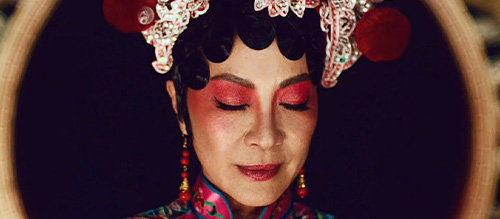10 Best Films 2022: Joseph Wade
5. Everything Everywhere All at Once

Everything Everywhere All at Once Review
If any film released in 2022 spoke most accurately of our era of social media and instant gratification, it was the surprising, endlessly imaginative and intricately concocted science fiction family drama Everything Everywhere All at Once, with its constant dopamine hits, segmented narrative and themes of generational divides and unlearning problematic behaviour.
Told with all the flair and style of a film with ten times its $25million budget, and comparable to any of the year’s biggest blockbusters in terms of visual presentation and action – some of which was nothing short of exhilarating – Everything Everywhere All at Once offered bits of everything for everyone, from the catharsis of a loving embrace between a distanced mother and daughter to a fight involving two grown men wearing butt plugs.
Directorial duo The Daniels brought together a genre-busting piece with all the sense of humour of their debut Swiss Army Man, and used its multiverse trappings to create one of the most exciting and rapidly paced films of the year. Better still, the duo used this formula and all that it offers in terms of marketability and excitement, to formulate one of 2022’s most surprisingly down to earth fables, a celebration of the ordinary person as being heroic for living an ordinary life in the face of a society insistent upon each of us striving to be more productive and “successful” than simply being a loving parent, child, sibling or friend.
Everything Everywhere All at Once might be most immediately remembered for its outrageous comedy set pieces and well-designed action, but what it says about family and about the collective us is what makes it so impactful, so great, so utterly unmissable.
4. The Northman

The Northman, the third feature film from acclaimed folk-horror director Robert Eggers, is filled with as much blood and righteous vengeance as any number of other historical epics and was marketed almost exclusively at the ‘Game of Thrones’ crowd, but this operatic fable of vengeance, legacy and masculinity isn’t so much an executive-driven bit of dopamine-hitting escapism as it is a poetically read, true to life legend seen through the lens of an incredibly unique up-and-coming auteur.
Alexander Skarsgård is exceptionally emotive in his virtually silent lead portrayal; his performance is almost entirely physical, his long limbs and muscular physique trudging through each frame on his character’s journey to inevitable blunt force trauma. His arc is one of revenge that turns into betrayal, his simple masculine world view of using his fists to solve his problems unravelled by a pair of women he thought he loved. His violence is recoiled, his great lesson in The Northman being that what he understood of his legacy is not the actuality of his past or his lineage. It’s a fable set deep in the Viking past, inspired by work written centuries ago, and yet it speaks so precisely of the crisis of man in our current moment, our collective rejection of historic patriarchal ideals.
Visually resplendent, particularly in the dark of the Icelandic hills, and Shakespearian in its tightly woven story and huge narrative swings, The Northman is one of the year’s most impressively cinematic and thought-provoking pieces. Its long-term legacy may be that it is accepted more as an exceptional piece of filmmaking as opposed to a contemporarily relevant fable of manhood, but in the moment this Robert Eggers film must be recognised as a unique, timely, and incredibly intelligent piece of screen poetry; an unmissable event with so much to explore.
3. The Souvenir: Part II

Joanna Hogg’s follow-up to her brave, open and magnetic autobiography The Souvenir (2019) is nothing short of a self-reflective masterstroke of finding one’s self in the midst of life-altering grief; a film with all the expressionistic tendencies of the great authorial pieces and so much invaluable introspection that the writer-director not only paints a portrait of herself, wrinkles and all, but does so in a manner that is intrinsically about a woman’s place in cinema, which we can all agree is the most timely of topics to explore.
As a piece of authorial cinema, few films released in recent decades can come close to the layers of introspection piercing each and every scene of The Souvenir: Part II. Hogg’s own self-reflection is present in Honor Swinton Byrne’s beautifully portrayed protagonist Julie attempting to complete her own autobiographical film school production, the writer-director using the character’s pursuit of artistic truth to commentate on her own self-reflective process and raise vital points about filmmaking intention, how personal circumstances forge each artist’s voice, and to ponder the question of whether anyone is ever truly capable of setting their truest self aside when pursuing anything within the realm of art.
Heart-breaking and truthful in an autobiographical sense, it isn’t even exclusively a film for filmmakers and film critics, it’s a deep and powerful personal tale of grief and love and pursuing passions in the midst of all that life can throw at you. It’s beautifully told, a love letter to motherhood and parent-daughter relationships, a diary on the microaggressions women face from men on a day to day basis; how the fruits of artistic labour can better exemplify the love between two people than anything else can.
The Souvenir: Part II is moving, it’s majestic, it’s poised. There’s a heart to its story that can tear you to pieces, and yet as a self-portrait it comes to mean even more – this is a woman taking ownership of her artistic voice, both on the screen and behind the scenes; a magnificent and authorial piece of cinema that reminds each of us of the art that underpins the very best of what we see each and every year.


Can’t believe RRR didn’t make the list.